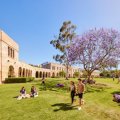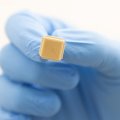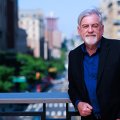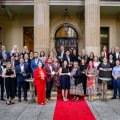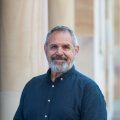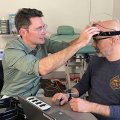Eight researchers and two research supervisors working across a range of disciplines were celebrated at a University of Queensland awards ceremony last night.
The researchers collectively will receive more than half a million dollars in funding for their projects.
The 2013 UQ Foundation Research Excellence Awards and the Awards for Excellence in Research Higher Degree Supervision are a highlight of UQ’s annual Research Week.
UQ welcomed Professor Robyn Owens, Deputy Vice-Chancellor (Research) from the University of Western Australia, as guest speaker at the awards ceremony.
The UQ Foundation Research Excellence Awards – now in their 15th year – aim to foster excellent early-career researchers and support their career advancement.
This year’s $571,000 in award research funding went to eight researchers from a range of faculties, centres, schools and institutes across the University. They are:
Dr Lachlan Coin, of the Institute for Molecular Bioscience, who receives $90,000 for his project, Identification of structural variation associated with auto-immune disorders. Dr Coin is seeking to better understand the genetic architecture of Systemic Lupus Erythematosus and Ankylosing Spondylitis so that better therapeutics can be developed.
Dr Jan Packer, of the Faculty of Business, Economics and Law, who receives $60,000 for her project, Taking a break: the restorative benefits of short breaks and vacations. Dr Packer will seek to determine which attributes of short breaks and vacations are most beneficial in enabling people to recover their ability to cope with work and everyday life.
Dr Knox Peden, of the Faculty of Arts, who receives $11,000 for his project, Secularism and philosophy: the challenge of Spinozism. Dr Peden says the resurgence of religious conflict around the world has acquired renewed importance. He will analyse the pivotal role played by controversial philosopher Benedict de Spinoza (1632-1677) in the history of debates about secularism and the nature of religion in relation to science and politics.
Dr Kate Schroder, from the Institute for Molecular Bioscience, who receives $80,000 for her project, Pinpointing the initiation of immune response. She is researching the “inflammasome”, which activates the immune system during infection. “If we know the pathways that allow our bodies to fight infectious disease, we may be able to develop drugs to boost our natural defences,” Dr Schroder says.
Dr Gene Tyson, Faculty of Engineering, Architecture and Information Technology, and the Australian Centre for Ecogenomics, who receives $90,000 for his project, Microbial dynamics in a warming world. Dr Tyson's
project focuses on the processes underpinning methane emissions from thawing permafrost. These northern hemisphere areas are of particular concern as climate change-induced permafrost melt is transforming methane sinks into sources.
Dr Claudia Vickers, from the Australian Institute for Bioengineering and Nanotechnology, who receives $80,000 for her project, From a petrochemical to a biochemical economy. Dr Vickers is using synthetic biology to produce sustainable, environmentally friendly fuels and chemicals from engineered microbial cell bio-factories. She is engineering yeast cells with improved bio-conversion of sugar, and testing the technology on production of bio-jet fuel.
Dr Kerrie Wilson, from the Faculty of Science, who receives $90,000 for her project, Incorporating hydrologic ecosystem services (supply, flows and beneficiaries) into land use planning. Dr Wilson’s project aims to bring better understanding of the supply and flow of fresh water, in order to enhance land-use planning for conserving biodiversity and the ecosystem services on which humans depend.
Dr Jian Yang, Queensland Brain Institute, who receives $70,000 for his project, Quantifying the overall contribution of all the DNA variants to motor neuron disease. Dr Yang will analyse thousands of DNA samples and other medical data. At the end of this project, Dr Yang’s method and software tool will be made freely available to the research community for other diseases of interest.
UQ President and Vice-Chancellor Professor Peter Høj said it was a priority for UQ to appropriately reward and mentor early and mid-career researchers.
“This may well be one reason why UQ performs so well on local and national rankings tables,” Professor Høj said.
“UQ was the first Australian university to introduce an awards program of this type, in 1999.”
UQ Deputy Vice-Chancellor (Research) Professor Max Lu congratulated the award winners and said all showed exceptional promise in becoming leaders in discovery.
"These awards have a proven track record in identifying researchers who go on to great success,” Professor Lu said.
"Since the inception of these awards, UQ has provided more than $9.17 million to 126 researchers.
“Some of these have gone on to attract tens of millions of dollars to Queensland. They have helped shape the economy as well as their own areas of research.”
Professor Lu said about half of all the Foundation Research Excellence Awards winners had later secured sought-after fellowships from the Australian Research Council, the National Health and Medical Research Council, the Queensland government – or combinations of these.
Two higher degree supervisors received the UQ Awards for Excellence in Higher Research Degree Supervision at last night’s ceremony. They are:

Professor Jeff Coombes, School of Human Movement Studies. In his role as Professor in Exercise and Sports Science, Professor Coombes has seen more than 20 research higher degree students to completion. He has published 150 peer-reviewed articles and received more than 10 national/international conference presentation prizes.
Professor Coombes encourages his students to develop their research independence. He provides them with opportunities to exchange ideas and knowledge among their peers, and meets with them weekly, without fail.
His approach is tailored to each student, many of whom attribute their professional and personal goals to his support, leadership and enthusiasm. Students and colleagues describe him as generous, engaging and approachable.

Professor Dee Bradshaw, Sustainable Minerals Institute, has supervised 30 research higher degree candidates to completion and mentored many more from around the world. Her students are highly sought after, with many progressing to senior positions within industry and academia.
Professor Bradshaw has initiated and developed postgraduate courses in Flotation Chemistry, Process Mineralogy and Geometallurgy, and has contributed to a number of professional development courses for industry. She has a strong commitment to industry engagement, applied research and postgraduate education.
Students and colleagues describe Professor Bradshaw as a nurturing leader dedicated to bringing out the best in people.
Contact: Fiona Cameron, UQ Communications, ph +61 7 3346 7086, f.cameron2@uq.edu.au.
.jpg)
